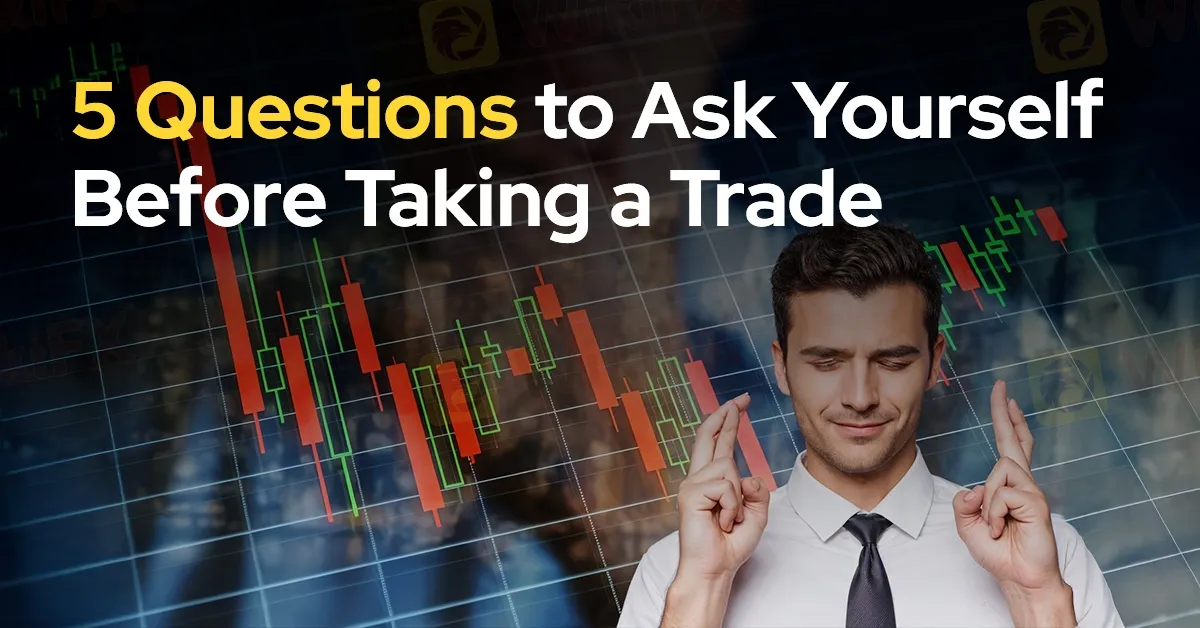简体中文
繁體中文
English
Pусский
日本語
ภาษาไทย
Tiếng Việt
Bahasa Indonesia
Español
हिन्दी
Filippiiniläinen
Français
Deutsch
Português
Türkçe
한국어
العربية
5 Questions to Ask Yourself Before Taking a Trade
Abstract:Before executing any trade, traders should pause and ask themselves critical questions to ensure they are making rational and well-informed decisions. Here are five questions to help you reflect on your strategy, manage risk, and control emotions before entering the market.

The allure of trading lies in its potential for financial gains, but the reality is that successful trading demands more than intuition or luck. It requires discipline, careful planning, and emotional control. Before executing any trade, traders should pause and ask themselves critical questions to ensure they are making rational and well-informed decisions. Here are five questions to help you reflect on your strategy, manage risk, and control emotions before entering the market.
1. Do I Have a Clear Trading Plan?
Every trade should be guided by a well-defined plan. Ask yourself if you have identified entry and exit points, set stop-loss and take-profit levels, and determined your position size. A clear trading plan helps eliminate impulsive decisions and provides structure. Without a plan, you are more likely to act on emotions, which can lead to unnecessary losses. A disciplined trader always follows their strategy, regardless of market noise.
2. Am I Prepared for the Risk Involved?
Trading is inherently risky, and no trade is guaranteed to succeed. Consider whether you are willing to accept the potential loss and how it fits within your overall risk management strategy. Experts recommend risking no more than 1-2% of your trading capital on a single trade. Ensure that the trade aligns with your risk tolerance and financial goals. Remember, trading is about preserving capital as much as it is about making profits.
3. What is My Emotional State Right Now?
Emotions are one of the biggest obstacles to consistent trading success. Before entering a trade, evaluate your mental and emotional state. Are you feeling stressed, overconfident, or desperate to recover from previous losses? Trading while emotionally unstable can lead to rash decisions and cloud your judgement. Take time to centre yourself and approach the market with a calm and focused mindset.
4. Have I Analysed the Market Thoroughly?
A hasty trade often stems from inadequate research. Reflect on whether you have conducted a thorough market analysis and checked for relevant economic or geopolitical events that could influence price movements. Understanding market conditions, trends, and technical indicators is crucial. Avoid relying on hearsay or impulsively acting on speculation. A well-researched trade is more likely to yield favourable outcomes.
5. What is My Exit Strategy?
Many traders focus solely on when to enter the market but fail to plan their exit. Ask yourself if you have a clear strategy for both winning and losing scenarios. Knowing when to exit a trade prevents you from holding onto losing positions for too long or cutting winning trades prematurely. An exit plan protects you from making decisions driven by greed or fear.

Trading requires patience, discipline, and a commitment to learning from both successes and failures. Rushing into trades without proper preparation can lead to costly mistakes. By asking yourself these five questions, you can approach the market with greater confidence and minimise emotional or impulsive actions.
Remember, trading is a marathon, not a sprint. Focusing on long-term consistency rather than short-term gains will pave the way for a more sustainable and successful trading journey.

Disclaimer:
The views in this article only represent the author's personal views, and do not constitute investment advice on this platform. This platform does not guarantee the accuracy, completeness and timeliness of the information in the article, and will not be liable for any loss caused by the use of or reliance on the information in the article.
Read more

Never Heard of Dynasty Trade? Here's Why You Should Be Worried
Have you heard this name before? No , it’s time you do because staying unaware could cost you. This platform is currently active in the forex trading and has been linked to several suspicious activities. Even if you’ve never dealt with it directly, there’s a chance it could reach out to you through ads, calls, messages, or social media. That’s why it’s important to know the red flags in advance.

Want to Deposit in the EVM Prime Platform? Stop Before You Lose It ALL
Contemplating forex investments in the EVM Prime platform? Think again! We empathize with those who have been bearing losses after losses with EVM Prime. We don't want you to be its next victim. Read this story that has investor complaints about EVM Prime.

WEEKLY SCAM BROKERS LIST IS OUT! Check it now
If you missed this week's fraud brokers list and are finding it difficult to track them one by one — don’t worry! We’ve brought together all the scam brokers you need to avoid, all in one place. Check this list now to stay alert and protect yourself from fraudulent brokers.

Catch the Latest Update on BotBro & Lavish Chaudhary
BotBro, an AI-based trading platform, became popular in India in 2024—but for negative reasons. Its founder, Lavish Chaudhary, who gained a huge following by promoting it heavily on social media. Since then, he has become well-known, but for many controversies. Let’s know the latest update about Botbro & Lavish Chaudhary.
WikiFX Broker
Latest News
Olymptrade Under Fire – Fraud Allegations and Investor Outrage
Hantec Markets Appoints New Executives for Growth in Dubai
Is the Forex Bonus a Genuine Perk or Just a Gimmick?
OctaFX Was Fined $37,000 for Operating Without a License
What Role do signals play in the forex trading?
5 Reasons Why Traders Are Losing Trust in Headway Broker
What WikiFX Found When It Looked Into Vestrado
Hantec Financial: A Closer Look at Its Licenses
eToro Joins Hands with Premiership Women’s Rugby
RM750 Million Lost to Investment Scams in Just Six Months
Currency Calculator


